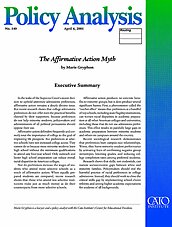In the wake of the Supreme Court’s recent decision to uphold university admissions preferences, affirmative action remains a deeply divisive issue. But recent research shows that college admissions preferences do not offer even the practical benefits claimed by their supporters. Because preferences do not help minority students, policymakers and administrators of all political persuasions should oppose their use.
Affirmative action defenders frequently and correctly tout the importance of college to the goal of improving life prospects. But preferences at selective schools have not increased college access. They cannot do so because most minority students leave high school without the minimum qualifications to attend any four-year school. Only outreach and better high school preparation can reduce overall racial disparities in American colleges.
Nor do preferences increase the wages of students who attend more selective schools as a result of affirmative action. When equally prepared students are compared, recent research shows that those who attend less selective institutions make just as much money as do their counterparts from more selective schools.
Affirmative action produces no concrete benefits to minority groups, but it does produce several significant harms. First, a phenomenon called the“ratchet effect” means that preferences at a handful of top schools, including state flagship institutions, can worsen racial disparities in academic preparation at all other American colleges and universities, including those that do not use admissions preferences. This effect results in painfully large gaps in academic preparation between minority students and others on campuses around the country.
Recent sociological research demonstrates that preferences hurt campus race relationships. Worse, they harm minority student performance by activating fears of confirming negative group stereotypes, lowering grades, and reducing college completion rates among preferred students.
Research shows that skills, not credentials, can narrow socioeconomic gaps between white and minority families. Policymakers should end the harmful practice of racial preferences in college admissions. Instead, they should work to close the critical skills gap by implementing school choice reforms and setting higher academic expectations for students of all backgrounds.

This work is licensed under a Creative Commons Attribution-NonCommercial-ShareAlike 4.0 International License.

